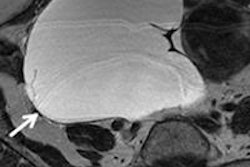British researchers have concluded that screening with ultrasound may reduce ovarian cancer mortality by an estimated 20% over a follow-up period of up to 14 years, according to a study published online on 17 December in the Lancet.
The United Kingdom Collaborative Trial of Ovarian Cancer Screening (UKCTOCS), led by Ian Jacobs from the Institute for Women's Health at University College London, added that longer follow-up is needed to determine the ultimate mortality reduction, and if screening the general population is cost-effective.
Jacobs and colleagues recruited more than 202,000 women between the ages of 50 and 74 between 2001 and 2005 from 13 trial centers in England, Northern Ireland, and Wales. Annual screening ended in December 2011 and follow-up lasted until the end of 2014, with a median follow-up of 11.1 years.
Ovarian cancers were diagnosed in 630 women with no screening, 338 subjects in a multimodality screening group that received both ultrasound and blood tests, and 314 women who received only ultrasound.
The study revealed a mortality reduction rate of 15% in the first 14 years in the mutimodality screening group and a mortality reduction of 11% in the ultrasound-only screening group.
The authors noted, however, there was little or no mortality reduction (8%) for the first seven years, with 23% relative mortality reduction between the 7th and 14th year.
After excluding women with undiagnosed ovarian cancer when the trial began, there was a significant reduction in deaths with an average mortality reduction of 20% and a decrease of 28% between the 7th and 14th year of follow-up.
There was also a significant reduction in deaths in the multimodality group, compared with the women who had no screening.



















